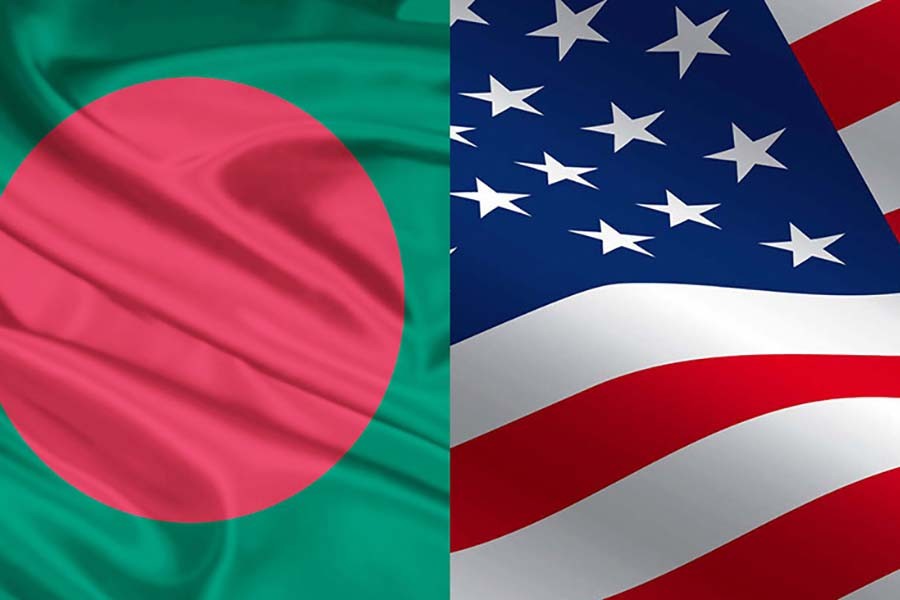
Published :
Updated :

In the 1971 Liberation War of Bangladesh, the United States tilted towards Pakistan. However, within four months of its independence, the United States recognised Bangladesh and gradually developed good relations in every dimension, from trade to security.
Bangladesh and the United States have also commenced Annual Partnership Dialogue, which is crucial in deepening Dhaka-Washington ties.
US Deputy Assistant Secretary Afreen Akhter recently said Bangladesh has been an important strategic partner. Akhter also mentioned that the United States looks forward to a stronger relationship in the next 50 years.
According to the US State Department (2023), 'Bangladesh is an important regional partner on economic, climate, humanitarian, and security priorities'. Against this backdrop, this write-up focuses on why Bangladesh matters to the United States.
Bangladesh's geo-strategic importance
The geo-strategic location of Bangladesh makes it an important country for the United States in the context of the growing geopolitical rivalry and considering the geopolitical shift from the Middle East to the Asia-Pacific region and notably South Asia. In the competing geopolitical connectivity projects, Bangladesh has become an important country.
To understand the growing geo-strategic importance to the United States, it becomes necessary to look at several important policy documents.
Bangladesh's geo-strategic importance was reflected in the 2012 Fact Sheet of US Relations with Bangladesh, prepared for the US Department of State. It has also been claimed that Bangladesh is a key US strategic partner in South Asia' (USDS, 2012).
Former American Ambassador to Bangladesh Dan Mozena (2013) observed that Bangladesh is a country that matters a lot to America and to the world.
In addition, in a letter to members of Congress in May 2013, Dan Mozena warned, "Good relations with Bangladesh are vital to regional security and United States strategic interests."
The geo-strategic importance of Bangladesh was also reflected in a 2010 Congressional Research Service report titled - 'Bangladesh: Political and Strategic Developments and US Interests.' It argued that Bangladesh is a nation of strategic importance not only to the South Asian sub-region but to the larger geopolitical dynamics of Asia.
Bangladesh has played, and will likely continue to play, a role in the shifting regional balance of power between India and China. In the policy document, Bangladesh's geo-strategic location and its importance were also highlighted: Bangladesh is situated at the northern extreme of the Bay of Bengal and could potentially be a state of increasing interest in the evolving strategic dynamics between India and China.
This importance could be accentuated by the development of Bangladesh's energy reserves and regional energy and trade routes to China and India. Hence, Bangladesh is of interest to the United States for its role in the larger geopolitical dynamics of South Asia.
Economic interests
From the US perspective, economic interests stand out as the single dominant factor in its relations with Bangladesh, which is evident from a listing of foreign policy objectives published by the State Department in 1976.
Notably, on that list, four out of five foreign policy objectives of the United States in Bangladesh were directly or indirectly related to the economic interests of the US.
Although it was the 1976 US foreign policy objectives, to date, it remains the same as the Congressional Report 2010 testified the same while pointing out that American interests with Bangladesh include promoting development, trade, energy, democracy support, countering militant Islamists, and working together in peace operations.
President Obama had also emphasised how economically important Bangladesh's market is to the prosperity of the American people. US firms recognise the country's potential and are eager to do business. In fact, one can argue that trade and investment are two key economic interests of the US in Bangladesh.
Security issues
Nurturing a warm relationship with Bangladesh also serves the security interest of the United States. The policy paper Bangladesh: Political and Strategic Developments and US Interests identified that Bangladesh and the United States have a common interest in countering extremism and their ideology.
According to the US Department of State, Bangladesh's efforts at development, countering violent extremism, assisting international peacekeeping, and improving regional connectivity are vital to regional and global stability.
In addition, in the United States's Country Reports on Terrorism 2011 and Country Reports on Terrorism 2012, Bangladesh's cooperation with the United States in combating transnational terrorist groups was acknowledged.
Bangladeshis in the US
The Bangladeshi diaspora in the United States contributes significantly to the latter's socio-economic development. According to the data from Pew Research, the Bangladeshi population living in the United States was 57,000 in 2000, which increased to 208,000 in 2019.
Bangladeshi diaspore is better educated than the locals in some ways. For instance, according to Pew Research, 26 per cent of the Bangladeshi population attained Bachelor's degree in 2019, while 20 per cent of Americans attained the degree.
Similarly, while 23 per cent Bangladeshi population completed post-graduate degrees, only 13 per cent of Americans attained post-graduate degrees.
These educated Bangladeshi people contribute immensely to the socio-economic development of the United States. In addition, the Bangladeshi diaspora also adds a rich Bengali culture to the American culture.
Demographics
Bangladesh matters to the United States because the country is the fourth-largest Muslim country and the eighth-largest populated country in the world. Bangladesh is popularly known as a moderate, democratic, peaceful Muslim nation that promotes international peace and security, international justice, etc.
While in the post-9/11 era, many Muslim countries hated the United States because of its war on terror policy, Bangladesh maintained good relations. Thus, maintaining a good relationship with Bangladesh also serves the strategic interest of the United States to the wider Muslim world.
Dr Md. Shariful Islam is an Associate Professor of International Relations at the University of Rajshahi. He is also an adjunct research fellow at the KRF Center for Bangladesh and Global Affairs, Dhaka.
shariful_ruir@ru.ac.bd


 For all latest news, follow The Financial Express Google News channel.
For all latest news, follow The Financial Express Google News channel.